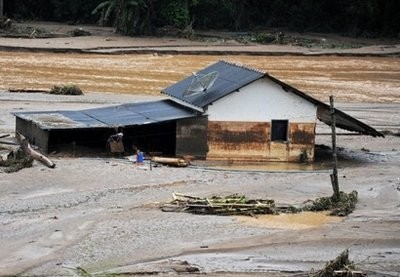Brazil is suffering its worst-ever natural disaster after mudslides near Rio de Janeiro that killed more than 500 people, according to the latest toll Friday.
Municipal officials in the Serrana region just north of Rio told reporters that at least 506 people were killed, surpassing the 437 killed in a 1967 mudslide tragedy that "up until now seen as the biggest (disaster) in Brazil," according to the news website G1.
It was feared more bodies were yet to be discovered as rescuers finally arrived in villages cut off because of destroyed roads and bridges in the region.
Efforts to locate survivors and bodies were going on under the risk of further mudslides, as rain continued to fall on the waterlogged region, making it even more unstable.
"It's very overwhelming. The scenes are very shocking," President Dilma Rousseff said after visiting the area Thursday.

She pledged "strong action" by her government, which has already released 470 million dollars in initial emergency aid and sent seven tons of medical supplies.
The catastrophe was seen as her first big test since taking power two weeks ago, taking over from her popular predecessor, Luiz Inacio Lula da Silva.
Storms early Wednesday dumped the equivalent of a month's rain in just a few hours before dawn, sending mudslides slicing through towns and hamlets, destroying homes, roads and bridges and knocking out telephone and power lines.
The worst affected towns were Novo Friburgo, which recorded 225 deaths, Teresopolis, with 223 deaths, and Petropolis, with 39 deaths, according to municipal officials. Another 19 fatalities were registered in the village of Sumidouro.
The toll of dead from this one disaster was higher than the 473 rain-related deaths recorded for all of Brazil over the span of 2010.
Churches and police stations were turned into makeshift morgues, the smell of decomposing corpses heavy in the warm air. Thousands of survivors took refuge in shelters.
Outside one morgue in Teresopolis, crowds looked at photos of the dead, searching for loved ones.
"I can't go inside. I don't have courage to," said one woman, Ana Maria, 40.
"You have no idea how hard it is to see the bodies of so many children... It's horrible," one fireman there told AFP.
Elsewhere in the town, in a gymnasium, hundreds of people left homeless by the calamity sat around on mattresses, still in shock, some injured.
Edmar Da Rosa, a 44-year-old laborer whose face was badly lacerated, looked lost and unable to comprehend the deaths of family members.
He said a retaining wall fell on part of his house that he shared with his wife, three children and a grandson.
"My wife died. My grandson ended up dying. And the others are hurt," he said.
A few meters (feet) away, 59-year-old Joao de Lima clutched a doll with desolation written on his face.
"I lost my four daughters and everything I had," he said softly.
























